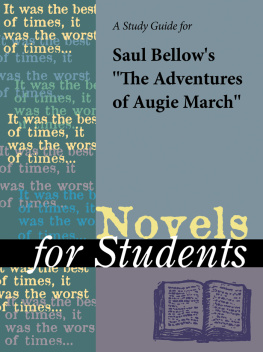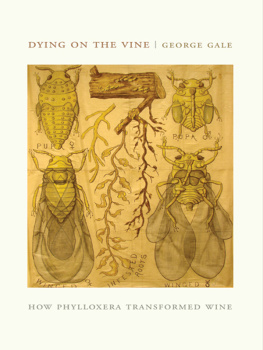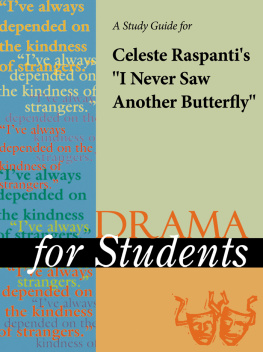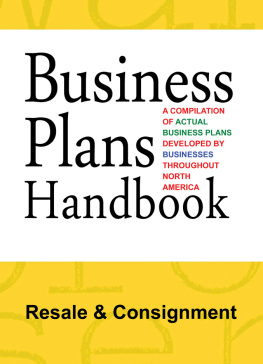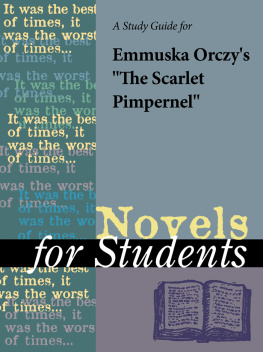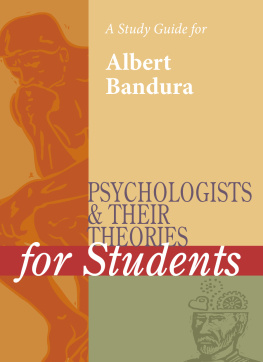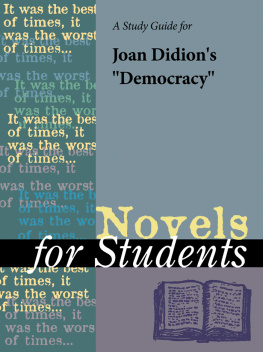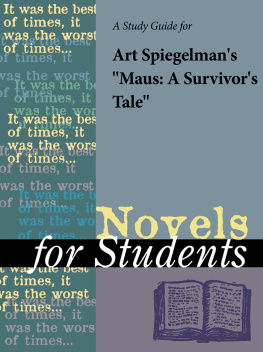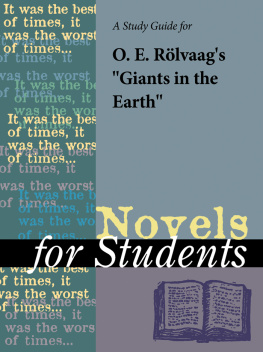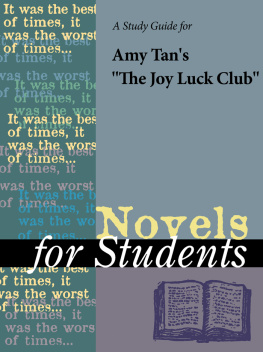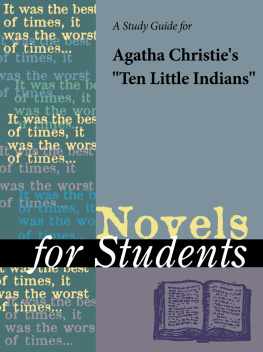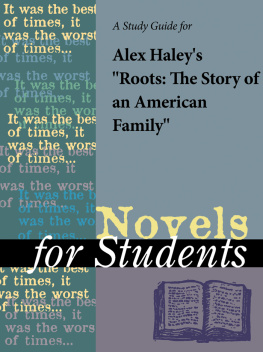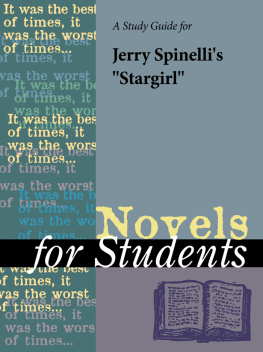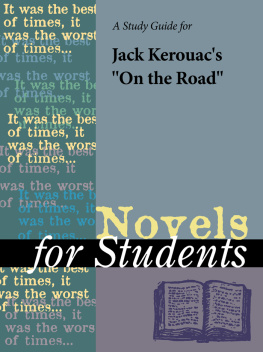TABLE OF CONTENTS
Guide
Novels for Students, Volume 33
Project Editor: Sara Constantakis
Rights Acquisition and Management: Leitha Etheridge-Sims, Kelly Quin, Tracie Richardson, Mardell Glinski Schultz
Composition: Evi Abou-El-Seoud
Manufacturing: Drew Kalasky
Imaging: John Watkins
Product Design: Pamela A. E. Galbreath, Jennifer Wahi
Content Conversion: Katrina Coach
Product Manager: Meggin Condino
2010 Gale, Cengage Learning
ALL RIGHTS RESERVED. No part of this work covered by the copyright herein may be reproduced, transmitted, stored, or used in any form or by any means graphic, electronic, or mechanical, including but not limited to photocopying, recording, scanning, digitizing, taping, Web distribution, information networks, or information storage and retrieval systems, except as permitted under Section 107 or 108 of the 1976 United States Copyright Act, without the prior written permission of the publisher.
Since this page cannot legibly accommodate all copyright notices, the acknowledgments constitute an extension of the copyright notice.
For product information and technology assistance, contact us at Gale Customer Support, 1-800-877-4253.
For permission to use material from this text or product, submit all requests online at www.cengage.com/permissions.
Further permissions questions can be emailed to permissionrequest@cengage.com
While every effort has been made to ensure the reliability of the information presented in this publication, Gale, a part of Cengage Learning, does not guarantee the accuracy of the data contained herein. Gale accepts no payment for listing; and inclusion in the publication of any organization, agency, institution, publication, service, or individual does not imply endorsement of the editors or publisher. Errors brought to the attention of the publisher and verified to the satisfaction of the publisher will be corrected in future editions.
Gale
27500 Drake Rd.
Farmington Hills, MI, 48331-3535
ISBN-13: 978-1-4144-4171-9
ISBN-10: 1-4144-4171-1
ISSN 1094-3552
This title is also available as an e-book.
ISBN-13: 978-1-4144-4949-4
ISBN-10: 1-4144-4949-6
Contact your Gale, a part of Cengage Learning sales representative for ordering information.
Printed in the United States of America
1 2 3 4 5 6 7 14 13 12 11 10
The Adventures of Augie March
Saul Bellow
1953
Introduction
Published in 1953, Saul Bellow's sweeping, comedic novel The Adventures of Augie March, was heralded by many reviewers as an instant classic, and it established its author as a major voice in American fiction. It is a bold, ambitious novel that claims that the story of a young, poor, fatherless, Jewish man belongs at the center of American literature as well as at the center of the American experience itself. In the course of the novel, Augie seeks to find his place in the world, and his desire for what he calls his "better fate" leads him on dozens of adventures, some tedious, some exhilarating, from selling coal to training an eagle to stealing college textbooks. Intertwined with these many occupations are numerous romantic escapades with chambermaids, heiresses, actresses, and others, through which Augie strives to find both true love and amorous excitement.
Centered in Chicago, the story is told from Augie's point of view in a seemingly endless torrent of words. The novel teems with American idiom, slang, and the music of urban immigrant speech. Through Augie, Bellow paints intensely rich, and often hilarious, portraits of Chicagoans of all stripes from the years before the stock market crash of 1929, through the Great Depression and World War II, finally coming to rest in postwar Paris. The joy with which Bellow presents this world, combined with Augie's liberal use of references from classical mythology and European literature as he describes his experiences, elevates the story to the level of a truly American coming-of-age epic.
Author Biography
Saul Bellow was born in 1915 in Lachine, Quebec, Canada, and was the fourth child of parents who had emigrated from Russia just two years before. When he was nine, his family moved again, settling in Chicago. After finishing high school, Bellow attended the University of Chicago for a year before transferring to Northwestern University, where he graduated with honors in sociology in 1937. His first two novels, Dangling Man and The Victim, appeared in 1944 and 1947, respectively, to mostly positive reviews but did not sell widely. In the late 1940s, Bellow traveled Europe, part of the time as a Guggenheim Fellow. With the publication of The Adventures of Augie March in 1953, Bellow moved into the top tier of American writers both in terms of popularity and critical reputation. Augie March won the National Book Award for Fiction in 1953, the first of three times Bellow would win the award. Over the next half century, Bellow produced a number of successful and important novels, including Seize the Day (1956), Henderson the Rain King (1959), Herzog (1964), and Humboldt's Gift, which won a Pulitzer Prize in 1975. In 1976, Bellow was awarded the Nobel Prize in Literature.
Although he had worked for left-wing magazines in earlier years, Bellow became disenchanted with liberal views as the years passed. After 1966, Bellow taught at the University of Chicago and increasingly became identified with conservative thinkers at that school. He traveled the college lecture circuit and often clashed with the liberal counterculture that was sweeping the country. In 1970, students at San Francisco State University booed Bellow off stage following a speech he gave there.
In the 1980s Bellow married for a fifth time and took a position at Boston University. Perhaps because his work reflected his growing cynicism about American society, critics were less enthusiastic about the novels he continued to write. In 2000, however, Bellow published a final novel, Ravelstein, which met with highly positive reviews. Bellow died in 2005.
Plot Summary
Chapters 1-4
The first four chapters of The Adventures of Augie March introduce us to Augie and his family and the immigrant, Jewish world of his section of Chicago. Augie, the narrator and main character, declares in the opening sentence that "I am an American, Chicago born and go at things as I have taught myself, freestyle, and will make the record in my own way." Augie introduces his "simple-minded" mother, who has very few teeth and poor eyesight; his "idiot" brother, Georgie; and his older brother, Simon. His father is apparently dead, and Augie knows next to nothing about him. Ruling over the household is Grandma Lausch, who is not really a relative but instead a willful boarder who hopes to make something of the March boys. When Augie is beaten up by neighborhood boys, who appear to pick on him because he is Jewish, Grandma begins his worldly education, telling Augie that the beating is his own fault and he should not try to fit in with whomever is around him.
Grandma arranges for Augie to pass out handbills for a theater. Then, when he is twelve, she sends him to Chicago's North Side to work for his successful cousins, the Coblins. Simon, meanwhile, is sent to work at a resort hotel. At the Coblin's, Augie is treated kindly by Anna Coblin, who buys him new shoes and a jackknife. He helps deliver newspapers for Coblin and also helps Anna's brother, known as Five Properties, on his route as a milk truck driver. Although Anna hopes Augie will marry into the family, he already has his eye on a different future.

